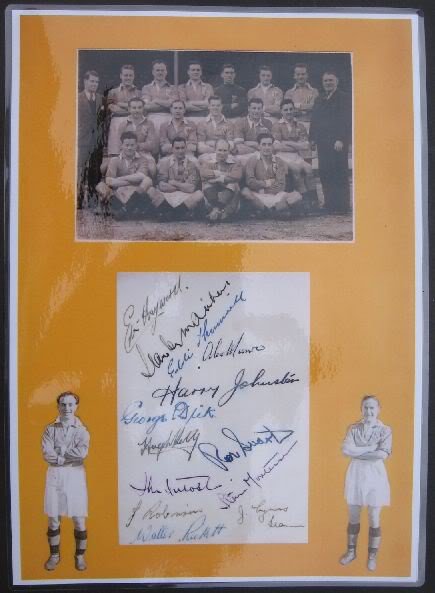Stephen Dobbie has of course recently joined Ian Holloway`s Blackpool on loan in their bid to play in England`s Premier League. He is by no means though the first Doonhamer related connection with The Seasiders. Perhaps the most obvious connection is a player already featured in Queens Legends, George Farm. There is also the story of Jimmy McIntosh.
Jimmy McIntosh was born in Dumfries on 5th April 1918. A quick, strong, stocky forward, he played his entire senior career outside of Scotland. While he enjoyed a very respectable professional career in football, he is perhaps as well known for a game that he missed as he is for what he achieved in the game.
After playing with non league Droylsden, Jimmy McIntosh made his first team debut for top division Blackpool on 21st September 1935. Aged 17 years and 169 days, at the time this was a new record as the youngest player to cross the white line on to a football pitch in a senior game for Blackpool. The opposition was another of Dobbie’s clubs, namely Swansea Town as the Welsh outfit were then called. In this spell the teenage McIntosh played five league games for Blackpool.
In 1938 McIntosh joined another top tier side, nearby rivals Preston North End (where among his team mates was Bill Shankly). After 27 league appearances (with three goals) and at the age of 21 his career, like his contemporaries of the era, was put on hold in 1939 with the UK joining the resurrection of global conflict leading to the abandonment of league football in England as well as Scotland.
After World War 2 and the resumption of English League football for season 1946/47, McIntosh returned to Blackpool. At home on 30th November 1946, he was among the scorers in the 3-2 win over that season’s eventual champions, Liverpool. Goals against the Anfield outfit became something of a McIntosh signature in his time with Blackpool – he scored two more in another home victory over Liverpool the season after.
The nearest encounter McIntosh had with English silverware was in 1947/48. McIntosh scored five goals in five games to help take The Tangerines to their first ever FA Cup Final. The cup semi final headline grabber though was Stan Mortensen with an equaliser four minutes from time and two more in extra time for a 3-1 win against Spurs.
McIntosh was left out of the team by manager Joe Smith for the final against Man United at Wembley. When Mortensen put Blackpool 2-1 up in the 35th minute, Smith must have been feeling vindicated in his selection policy. However that’s not the way things turned out. Man U turned it around with three goals in the last 20 minutes for a 4-2 win – Matt Busby’s first trophy as manager and the first time the Red Devils had lifted either of England’s two major domestic trophies since 1911.

(Blackpool team photo from 1948 and autographs. McIntosh`s is 3 from bottom on the left beside Stan Mortensen`s)
With a twist of fate the same two sides met again in a league fixture the following midweek. McIntosh was this time selected and Blackpool were indeed this time the victors with a 1-0 home win, but had the stakes been as high as the Wembley encounter then we can only speculate at the possible outcome. McIntosh rounded the season off in dramatic style the Saturday after – he hit five in the end of season 7-0 league win against ex side Preston. His five goals in one game is a Blackpool club record shared with Jimmy Hampson.
In his last season at Bloomfield Road (1948/49) another goal against Liverpool helped McIntosh to a tally in his second Blackpool spell of 22 goals from his 66 league games. Perhaps aware of his record against their Merseyside rivals, McIntosh was signed by Everton where he scored 19 goals in 58 league appearances. He continued at Goodison with yet more scoring against former sides with a goal in a 5-0 win over Blackpool and maybe still with a point to prove, he scored in a 2-0 win over Man United.
After leaving Everton in 1951 he moved across to Northern Ireland with Distillery for whom as well as playing he bridged into management.
Jimmy McIntosh died in 2000.